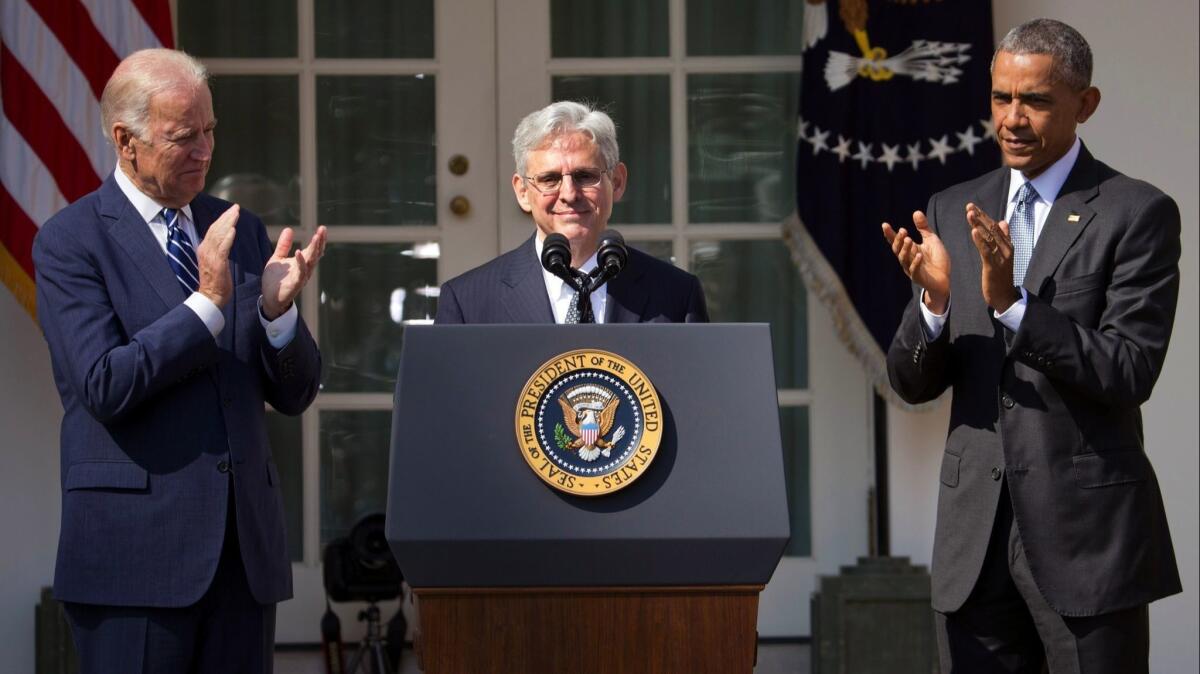Op-Ed: Revenge for Merrick Garland? Democrats don’t have history on their side

- Share via
In 2016, Republicans argued that voters should get a say in the presidential contest before filling the Supreme Court vacancy created by Justice Antonin Scalia’s death. They refused to consider President Obama’s nominee, Merrick Garland. Now, four months before the midterms, President Trump has tapped Brett Kavanaugh to replace Justice Anthony Kennedy. Should Kavanaugh get the Garland treatment? If history is a guide, the answer is no. There’s a world of difference between a presidential and a midterm election.
Scalia’s death led to only the third Supreme Court nomination in a presidential election year since World War II, and all three vacancies were filled by the winner. (William Brennan’s recess appointment by Dwight Eisenhower was only confirmed after Ike was reelected in a landslide.)
Before World War II, the Senate refused to let Presidents Rutherford B. Hayes, James Buchanan, Millard Fillmore, John Tyler and John Quincy Adams fill a vacancy during a presidential election year. A hostile Congress did worse to Andrew Johnson after the Civil War; he was stripped of his nominating power.
Democrats probably can’t break with history by denying Kavanaugh a vote, and they have only themselves to blame.
In all of American history, only one Supreme Court nominee in a presidential election year was confirmed before the election by a Senate of the opposing party. That was in 1888, when the court was facing a critical backlog of cases, there was no chief justice, and the Democratic president (Grover Cleveland) nominated a judge acceptable to Republicans.
Now and again presidents have succeeded in pushing through a nominee in a presidential election year — but only when their party ran the Senate, or when the nomination had been submitted the previous year. Kennedy, for example, was confirmed in February 1988, but he was Ronald Reagan’s third choice, nominated in 1987 after two other nominations failed. The rules for hearings and floor votes have gone back and forth over the years, but the Senate majority has nearly always had its way in the end.
Democrats lost the Garland fight because they lost the Senate in 2014.
Midterm elections are different. Two of the four Democrat-appointed justices on the Supreme Court were nominated and confirmed in midterm election years (Justice Elena Kagan in 2010 and Justice Stephen Breyer in 1994). Breyer, like Scalia in 1986, was confirmed less than four months before the president’s party lost the Senate, and Democrats got Breyer through even while Clinton was the subject of an independent prosecutor’s investigation. Other justices confirmed in midterm election years include David Souter in 1990, Harry Blackmun (the author of Roe vs. Wade) in 1970, and Earl Warren (who joined the court just in time to write Brown vs. Board of Education) in 1954.
Enter the Fray: First takes on the news of the minute from L.A. Times Opinion »
In total, presidents have submitted nominations for 28 Supreme Court vacancies before a midterm election, and 27 were filled before the midterm. (The exception was Andrew Johnson.) The record’s 14 for 14 since 1914, when senators started being popularly elected.
Democrats probably can’t break with history by denying Kavanaugh a vote, and they have only themselves to blame: They eliminated the Senate minority’s right to filibuster lower-court judges in 2013, a move Republicans imitated for Supreme Court nominations in 2017. If they want to stop Trump from appointing another Supreme Court justice in the event of yet another vacancy during his term, they will have to win back the Senate.
Both parties have been guilty of hypocrisy, lies, obstruction and mischief with the rules in the judicial confirmation wars over the years. But Republicans who blocked Garland and now demand a vote for Kavanaugh are on solid historical ground. Elections have consequences, and the power to have Supreme Court justices confirmed before midterm elections is one of them.
Dan McLaughlin is an attorney in New York and a contributing columnist to National Review Online.
Follow the Opinion section on Twitter @latimesopinion or Facebook
More to Read
A cure for the common opinion
Get thought-provoking perspectives with our weekly newsletter.
You may occasionally receive promotional content from the Los Angeles Times.









